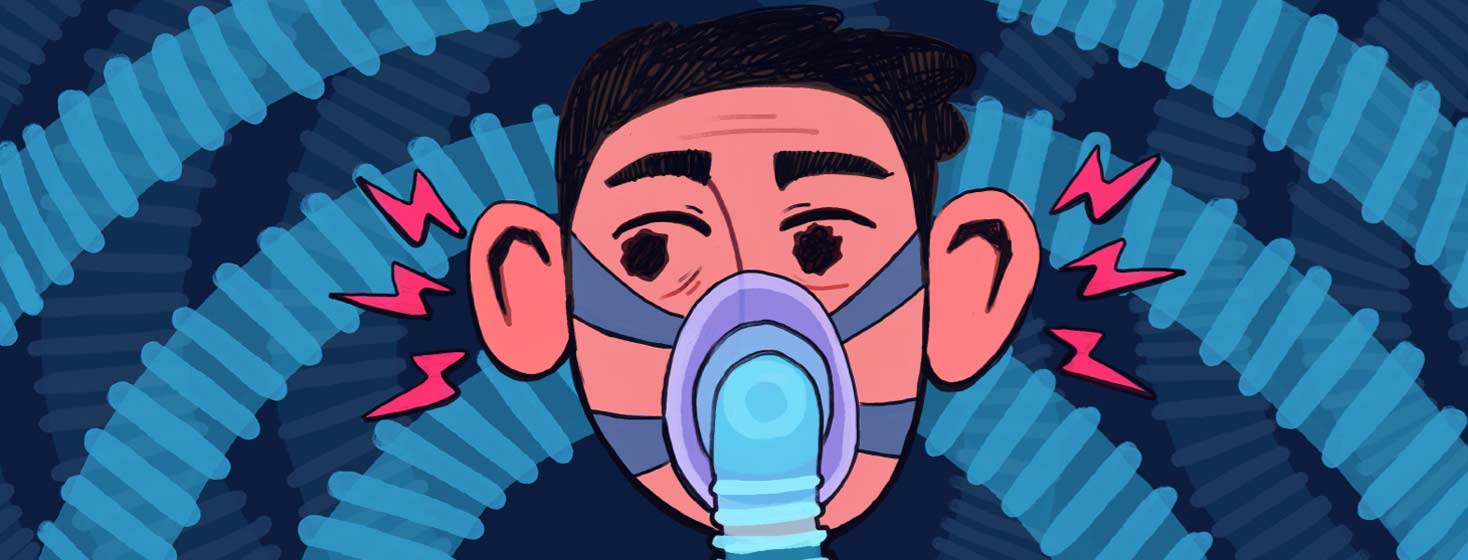Are My Sleep Apnea and Ringing Ears Linked?
Reviewed by: HU Medical Review Board | Last reviewed: December 2022 | Last updated: April 2024
Do you sometimes hear ringing, chirping, roaring, hissing, clicking, humming, or buzzing sounds that are not heard by others? If there is no external source for the sounds you hear, it is called tinnitus. It can affect just 1 ear or both. Up to 1 in every 5 people will experience tinnitus at some point in their life. But it is more common in the elderly.1,2
Tinnitus may seem to switch on and off. Or it may be present all the time. For some people, it interferes with their ability to hear normally. If your tinnitus lasts for more than 6 months, it is called chronic tinnitus.1,2
A link between tinnitus and sleep apnea?
Tinnitus is often connected to other health issues. Some research shows that sleep apnea and tinnitus are linked.1
What causes tinnitus?
Tinnitus is commonly caused by age-related hearing loss, an injury to the ear, or problems with your circulatory system. It can also be caused by ear infections and too much ear wax. In rare cases, a tumor in your middle ear or an inner ear balance disorder will cause tinnitus.1,2
Sometimes taking high doses of aspirin or non-steroidal anti-inflammatory drugs (NSAIDs) can also cause tinnitus. Stopping use of these medicines can also reduce the symptoms of tinnitus.2
Tinnitus itself is not a curable condition. But its symptoms can often improve by managing the underlying condition linked to it, such as sleep apnea.2
How can sleep apnea contribute to tinnitus?
We all have a bad night’s sleep sometimes. But if you have untreated obstructive sleep apnea (OSA), your sleep is affected every night. People with OSA have 1 to 100 episodes of being aroused per hour during the night. This happens because an obstruction to the airway leads to blood oxygen levels dropping to the point that the brain wakes.3
Sleep apnea places people at risk for health conditions such as stroke, diabetes, and heart disease. But a lesser-known link is hearing loss. A study of almost 14,000 adults found a 30 percent increased risk of hearing loss in those with sleep apnea.2
A second study of middle-aged and elderly people in Taiwan found that those with sleep apnea were more likely to also have tinnitus compared to those without sleep disturbances.4
A third study looked at past sleep history and current tinnitus symptoms. It found a strong link between poor quality of sleep in the past and having tinnitus.5
How does sleep apnea harm hearing?
Research is limited in this area, but there are some possible pathways for how OSA may lead to tinnitus. There is some evidence that, over time, low blood oxygen levels can harm cochlear hair cells. These sensory cells are located in the snail-shaped cochlea in the inner ear. Damage to these cells from age or injury can result in hearing problems.3,6
Low blood oxygen events caused by OSA may injure the cochlea over time due to repetitive episodes of loss of blood flow. There is only 1 artery that feeds the cochlea. So when blood flow is disrupted, the cochlea is vulnerable to injury from lack of oxygen.7
Another possible cause is inflammation. OSA may cause inflammation of the blood vessels. Vascular inflammation can lead to thickening and narrowing of the vessels, which may reduce blood flow. Similar to disrupted blood flow, reduced blood flow also reduces the delivery of oxygen to tissues and results in harm.8
Can using a CPAP help?
Research is very thin in this area and more studies are needed. In theory, using a continuous positive airway pressure (CPAP) machine could help prevent the onset of tinnitus or relieve its symptoms. This is because CPAP machines decrease sleep disruptions and increase blood flow. They also may reduce the wear and tear on your body caused by OSA that leads to vascular inflammation. However, no studies have been performed yet to test this link.3
Some studies report anecdotally that CPAP machines may make pressure in the middle ear worse. This may worsen tinnitus symptoms. The noise of the machine may also worsen tinnitus for some people.9,10
When to talk to your doctor
Science does not have a clear answer to the question of whether using a CPAP machine can prevent or lessen the symptoms of tinnitus. And what works for 1 person may not for another.
But you can be your own best advocate. If you have untreated OSA, talk to your doctor about whether a CPAP machine is right for you. Likewise, if you have OSA and use a CPAP but are still bothered by phantom tinnitus sounds, talk to your doctor. Getting a good night’s sleep is crucial for your overall health — and hearing.
If you have experienced tinnitus along with your sleep apnea, we would love to hear your story. Please share a comment.

Join the conversation